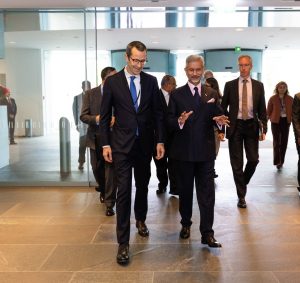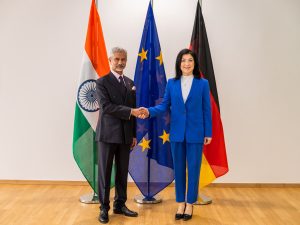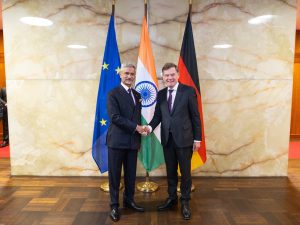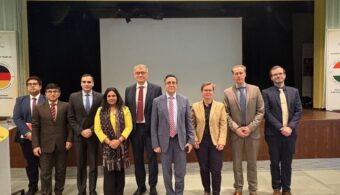As India and Germany mark 25 years of their strategic partnership, External Affairs Minister S. Jaishankar’s visit to Berlin this week offered more than just ceremonial symbolism. Against the backdrop of geopolitical turbulence and renewed concerns over terrorism, the visit became a platform for charting a bolder, forward-looking roadmap between the two democracies.
Jaishankar’s engagements — ranging from policy dialogues at the German Council on Foreign Relations (DGAP) to closed-door meetings with top leaders including Chancellor Friedrich Merz — reflected a dual-purpose visit: to reaffirm India’s commitment to a deeper, more modernized strategic partnership with Germany, and to firmly communicate India’s zero-tolerance approach to terrorism in the wake of the Pahalgam attack last month.
Meeting Chancellor Merz and German Leadership
In a key highlight, Dr. Jaishankar met German Chancellor Friedrich Merz in Berlin, conveying the best wishes of Prime Minister Narendra Modi and expressing appreciation for Germany’s solidarity as India counters the challenge of terrorism. The External Affairs Minister emphasized his eagerness to work closely with the new German government to elevate and expand the India-Germany Strategic Partnership.
 Jaishankar also held discussions with Dr. Günter Sautter, Foreign and Security Policy Advisor to the Chancellor, where they exchanged perspectives on major global issues, including the shared imperative to combat terrorism.
Jaishankar also held discussions with Dr. Günter Sautter, Foreign and Security Policy Advisor to the Chancellor, where they exchanged perspectives on major global issues, including the shared imperative to combat terrorism.
 Furthering the partnership on economic and industrial fronts, Jaishankar met with Minister of Economy and Energy Katherina Reiche. Their talks focused on enhancing talent linkages, deepening industry partnerships, and fostering joint collaboration aimed at building more resilient supply chains between the two nations.
Furthering the partnership on economic and industrial fronts, Jaishankar met with Minister of Economy and Energy Katherina Reiche. Their talks focused on enhancing talent linkages, deepening industry partnerships, and fostering joint collaboration aimed at building more resilient supply chains between the two nations.
A Relationship Ready to Be Upgraded
Speaking at the DGAP’s Centre for Geopolitics, Geoeconomics and Technology, Jaishankar emphasized that his early visit — barely weeks into the new German government’s term — was intentional.
“To be here early in the tenure of this government is so that we really lose no time in forging a pathway forward. After 25 years of partnership, it’s time to look at the next 25 and see where we can take our relationship,” he said.
The message was clear: India sees Germany not just as a key European partner, but as a central player in its global diplomatic strategy — one that bridges India’s Indo-Pacific priorities with Europe’s evolving strategic outlook.
From Defence to Digital: Four Pillars of Future Cooperation
Jaishankar laid out a clear four-pronged vision for the future of India-Germany ties, touching on areas where both nations’ interests align closely:
1. Defence and Security
Noting the historical ups and downs in bilateral defence ties, Jaishankar argued it’s time to “shed conservatism” and build a more resilient security relationship.
“There have been periods decades ago when our defence cooperation was active. But for various reasons, it cooled off. Now, both sides realise there’s much to offer each other,” he said.
He pointed to recent Indo-Pacific naval engagements involving German vessels, improved export licensing from Germany, and ongoing discussions around co-development and co-production of defence technologies. These developments, he said, signal a promising revival of strategic trust.
2. Talent and Mobility
With Germany facing a demographic crunch and India producing one of the world’s largest pools of skilled youth, both sides see mutual value in creating pathways for talent mobility.
“India’s demographic curve is in the right place. We can help address global talent shortages, and Germany is a natural partner in that effort,” Jaishankar noted.
India has been advocating for migration and mobility partnerships with European countries to ensure easier pathways for skilled professionals, students, and researchers — a win-win proposition in the current global workforce scenario.
3. Technology and Digital Cooperation
Calling it a “natural area for collaboration,” Jaishankar proposed closer partnerships in areas such as artificial intelligence, cybersecurity, digital infrastructure, and innovation ecosystems.
India’s burgeoning tech ecosystem and Germany’s engineering and manufacturing strengths could together form the bedrock of future digital industrial collaboration. The minister emphasized that the two countries need to align their innovation agendas and jointly navigate the regulatory and ethical aspects of emerging technologies.
4. Sustainability and Green Growth
Climate change cooperation remains a top priority for both countries, particularly in green hydrogen, renewables, and sustainable urban planning.
Jaishankar expressed hope that a long-awaited Free Trade Agreement (FTA) between India and the European Union could catalyze investment and cooperation in green sectors. Germany has already partnered with India in initiatives like solar power expansion and smart cities. Going forward, both sides are eyeing hydrogen diplomacy, circular economy technologies, and climate-resilient infrastructure as key focus areas.
Terrorism Casts a Shadow, But Solidarity Prevails
While economic and technological collaboration formed the bulk of the visit, recent regional security developments also shaped the dialogue. India’s military response to the April 22 Pahalgam terror attack, which killed 26 civilians, was fresh in memory as Jaishankar arrived in Berlin.
 At a joint press conference with German Foreign Minister Johann Wadephul, Jaishankar delivered a pointed message to India’s western neighbor:
At a joint press conference with German Foreign Minister Johann Wadephul, Jaishankar delivered a pointed message to India’s western neighbor:
“India will never give in to nuclear blackmail. Our response to terrorism will always be firm and proportional. We will deal with Pakistan bilaterally and decisively,” he said.
Jaishankar reiterated India’s zero-tolerance policy on terrorism and acknowledged Germany’s respect for India’s right to self-defence.
In turn, Germany expressed unambiguous support. Wadephul said, “We were appalled by the brutal terrorist attack. India has every right to defend itself. Germany supports all countries fighting terrorism. Terrorism must never have a place anywhere in the world.” He also welcomed the ceasefire following India’s Operation Sindoor and underlined the importance of dialogue and bilateral solutions.
India and Germany have maintained structured counter-terrorism dialogues for years, and this visit is expected to deepen intelligence cooperation and coordination on global counter-terrorism efforts.
Geopolitics in a Multipolar World
Jaishankar’s visit — his first foreign tour since the Pahalgam terror attack — comes at a crucial diplomatic juncture as India recalibrates its global partnerships amid growing multipolarity. While planned well in advance, the visit’s strategic significance surged after India launched Operation Sindoor, targeting terror camps in Pakistan and Pakistan-occupied Kashmir in early May, followed by a brief military escalation and ceasefire on May 10. The minister’s six-day, three-nation tour also includes the Netherlands and Denmark.
Germany’s foreign policy under Chancellor Merz is increasingly focused eastward, driven by changing power dynamics, trade realignments, and recognition of India’s growing global role.
“India and Germany coming closer can promote global stability, security, and prosperity,” Jaishankar said in a post on X. “We are preparing for a stronger partnership in a multipolar world.”
Looking Ahead
From climate tech and AI to counter-terrorism and defence, Jaishankar’s visit reflected a strategic maturity in India-Germany relations. As both countries navigate the next chapter of their bilateral journey, the tone from Berlin was one of intent, urgency, and convergence.
The visit has clearly set the tone for a more robust, modern, and resilient India-Germany partnership — one that can weather global headwinds while unlocking shared opportunities.



